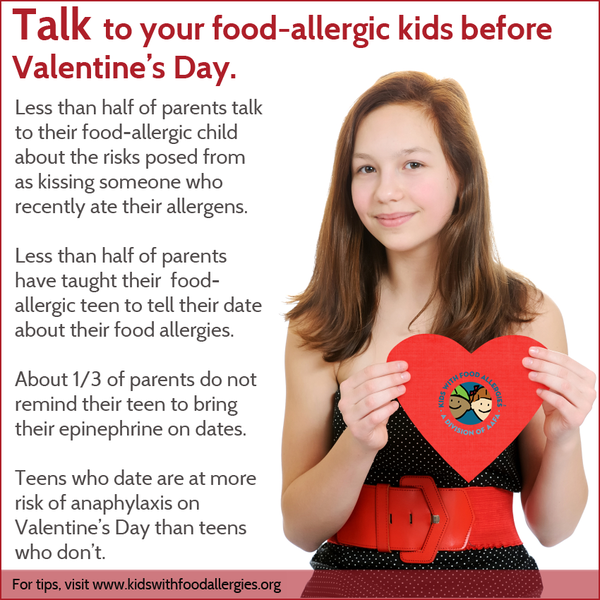Valentine's Day can bring kisses, cards with candy attached and party treats - Will you be talking with your child or teen with food allergies about how to stay safe for Valentine's Day?
Open communication about avoiding allergic triggers and being prepared for severe allergic reactions known as anaphylaxis can equip your child with the knowledge they need to keep themselves safe.
Here are 5 key tips to keep loved ones safe this Valentine's Day:
1. Communicate with your child and their teacher in advance.
Ask your child's teacher if students will be swapping Valentine's day cards. If so, involve your child in selecting a food allergy-safe Valentine's treat or card to share with the class. In addition, ask the teacher to check the cards your child receives before your child receives them and before sending them home.
You can provide the teacher with safe alternatives (stickers, pencils, allergen-free candy-free) to put in your child's Valentine's Day card collection.
If there will be a class party, try to volunteer so you can check the cards and candy yourself.
Teach your child not to open candies or cards before you have checked them for safety.
2. Understand how to read labels for the presence of food allergens.
On Valentine's Day, your child may be offered gifts of candy. Make sure your child knows to not to accept or eat any candy unless a parent, teacher or trusted adult has verified it is safe to eat.
If your child does bring home candy, check each candy's ingredient label carefully before your child eats it. Some candies of different sizes may have different ingredients. Also, some Valentine's Day candies are not processed in the same facilities as regular candy, and some may not have ingredient labels. If you cannot verify the ingredients, or if the candy is unwrapped, do not allow your child to eat the candy. Instead, exchange the candy for something safe that you have made or purchased.
Read these tips from KFA on how to read candy labels: What You Need to Know About Food Labels to Remain Safe This Valentine's Day.
3. Talk with your food-allergic teen before Valentine's Day.
A survey conducted by Mylan Specialty last year found that less than half of parents talked with their children about the risks posed by kissing someone who ate food containing their child's allergens. In addition, less than half of the parents taught their teens to tell their dates about food allergies. About one-third of parents surveyed did not remind their teen to bring epinephrine on dates. The survey found that teens who date are more at risk of anaphylaxis on Valentine's Day than teens who don't date.
4. Select a special allergy-safe treat to make at home for your family.
KFA's Safe Eats™ Recipes has hundreds of allergy-friendly recipes that are searchable by allergen you need to avoid, keyword, or category. Whether you would like to make a cake, cookies, chocolates or pie, KFA has recipes to help you.
If your child has an eosinophilic disorder or other condition that requires an elemental / amino acid formula diet, there are ways to celebrate without food. For example, small wooden heart-shaped boxes are available at craft stores and you can fill boxes with trinkets and toys. If sugar is safe for your child, KFA has several sugar-only recipes.
 Corn Free Marshmallows |  Peanut-Free Mock Buckeyes |  Sweetheart Sunbutter Pie |
 Hokey Pokey Sugar Honeycomb |  White Sugar Shapes | Thumbprint Cookies |
5. Review and discuss your food allergy emergency care plan with your child.
Your plan should include details about recognizing and reporting symptoms. It should require the child to have access to two epinephrine auto-injectors at all times. The plan should emphasize seeking immediate emergency medical care should anaphylaxis occur.
Review your plan in an age-appropriate way. For example, teach toddlers, preschoolers and younger grade school students to say, "No, thank you," when offered food from someone other than a parent. Importantly, young children also need to know to immediately speak to an adult if they feel like they are experiencing symptoms of an allergic reaction.
Kids With Food Allergies wishes you and your family a safe, love-filled Valentine's Day.



Comments (0)